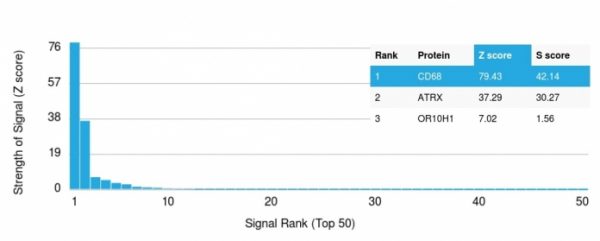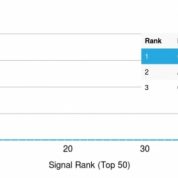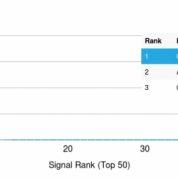Human Anti-CD68 (Macrophage Marker) Antibody Product Attributes
Species: Human
Tested Applications: Flow, IF, WB, IHC.
Clonality: Monoclonal
Anti-CD68 (Macrophage Marker) Antibody Clone: LAMP4/1830
Clone LAMP4/1830 Host and Isotype: Mouse IgG2b, kappa
Anti-Human CD68 (Macrophage Marker) Positive Control Sample: Tonsil, Lymph Node or Spleen
Cellular Localization of Antibody LAMP4/1830 Staining: Cytoplasmic
Buffer and Stabilizer: 10mM PBS with 0.05% BSA & 0.05% azide. Also available without BSA & Azide.
Antibody Concentration: 200 ug/ml
Antibody Purification Method:Protein A/G purified from Bioreactor concentrate.
Immunogen: Recombinant fragment of human CD68 protein (apprx. aa 150-301) (Please call for additional information.)
Storage Conditions: Store at 2 to 8 C (refrigerate). Stable for 24 months when properly stored.
CD68 (Macrophage Marker) Previously Observed Antibody Staining Patterns
Observed Subcellular, Organelle Specific Staining Data:
Anti-CD68 antibody staining is expected to be primarily localized to the vesicles and golgi apparatus.Observed Antibody Staining Data By Tissue Type:
Variations in CD68 antibody staining intensity in immunohistochemistry on tissue sections are present across different anatomical locations. An intense signal was observed in cells in the red pulp in spleen and macrophages in lung. More moderate antibody staining intensity was present in cells in the red pulp in spleen and macrophages in lung. Low, but measureable presence of CD68 could be seen inglial cells in the cerebral cortex. We were unable to detect CD68 in other tissues. Disease states, inflammation, and other physiological changes can have a substantial impact on antibody staining patterns. These measurements were all taken in tissues deemed normal or from patients without known disease.Limitations and Warranty
enQuire Bio's product, CD68 (Macrophage Marker) MonoSpecific Antibody, is available for Research Use Only (RUO-Only). This antibody is guaranteed to work for a period of two years when properly stored.








There are no reviews yet.